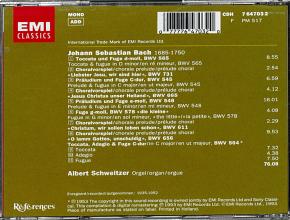Schweitzer, Albert
Albert SchweitzerAufgenommen 1935-1952
Signatur: M001-M030-D001-A006
Interpret: Schweitzer, Albert
Orchester: Symphonie-Orchester des Bayerischen Rundfunks, Dirigent Eugen Jochum
Chor: Chor des Bayerischen Rundfunks, Chorleiter Josef Schmidhuber
Komponisten: Bach, Johann Sebastian
Tonträger: CD
Herausgeber: EMI Records Ltd.
Veröffentlichung: 1993
Sprache: Deutsch
Spielerdauer: 76' 08''
Anzahl Tonträger: 1
Format: quer 16°
Größe (HxBXT): 12,5 x 14,2 cm x 1,0 cm
ISBN: 077776470320

Bitte loggen Sie sich ein um dieses Dokument ansehen zu können.
Inhaltsverzeichnis:
1. Toccata und Fuge d-moll, BWV 565; 2. Choralvorspiel: Liebster Jesu, wir sind hier, BWV 731; 3. Präludium und Fuge C-Dur, BWV 545; 4. Choralvorspiel: Jesus Christus unser Heiland; BWV 665; 5. Präludium und Fuge e-moll, BWV 548; 6. Fuge g-moll, BWV 578 "die kleine"; 7. Choralvorspiel: Christum, wie sollen loben schon, BWV 611; 8. Choralvorspiel: O lamm Gottes, unschuldig, BWV 656, Toccata, Adagio & Fuge C-Dur, BWV 564; 9. Toccata; 10. Adagio; 11. Fugue
Textpassagen (Auszüge):
"Few men have achieved distinction in so many fields as Albert Schweitzer. Born the son of a Lutheran pastor in Alsace in 1875, he was drawn to music at an early age, deputising at 9 for the local organist; and later, after studying theology, philosophy and musical theory at Strasbourg University, he continued his studies of the organ under Widor and the piano under Isidore Philipp in Paris. [...]"
1. Toccata und Fuge d-moll, BWV 565; 2. Choralvorspiel: Liebster Jesu, wir sind hier, BWV 731; 3. Präludium und Fuge C-Dur, BWV 545; 4. Choralvorspiel: Jesus Christus unser Heiland; BWV 665; 5. Präludium und Fuge e-moll, BWV 548; 6. Fuge g-moll, BWV 578 "die kleine"; 7. Choralvorspiel: Christum, wie sollen loben schon, BWV 611; 8. Choralvorspiel: O lamm Gottes, unschuldig, BWV 656, Toccata, Adagio & Fuge C-Dur, BWV 564; 9. Toccata; 10. Adagio; 11. Fugue
Textpassagen (Auszüge):
"Few men have achieved distinction in so many fields as Albert Schweitzer. Born the son of a Lutheran pastor in Alsace in 1875, he was drawn to music at an early age, deputising at 9 for the local organist; and later, after studying theology, philosophy and musical theory at Strasbourg University, he continued his studies of the organ under Widor and the piano under Isidore Philipp in Paris. [...]"